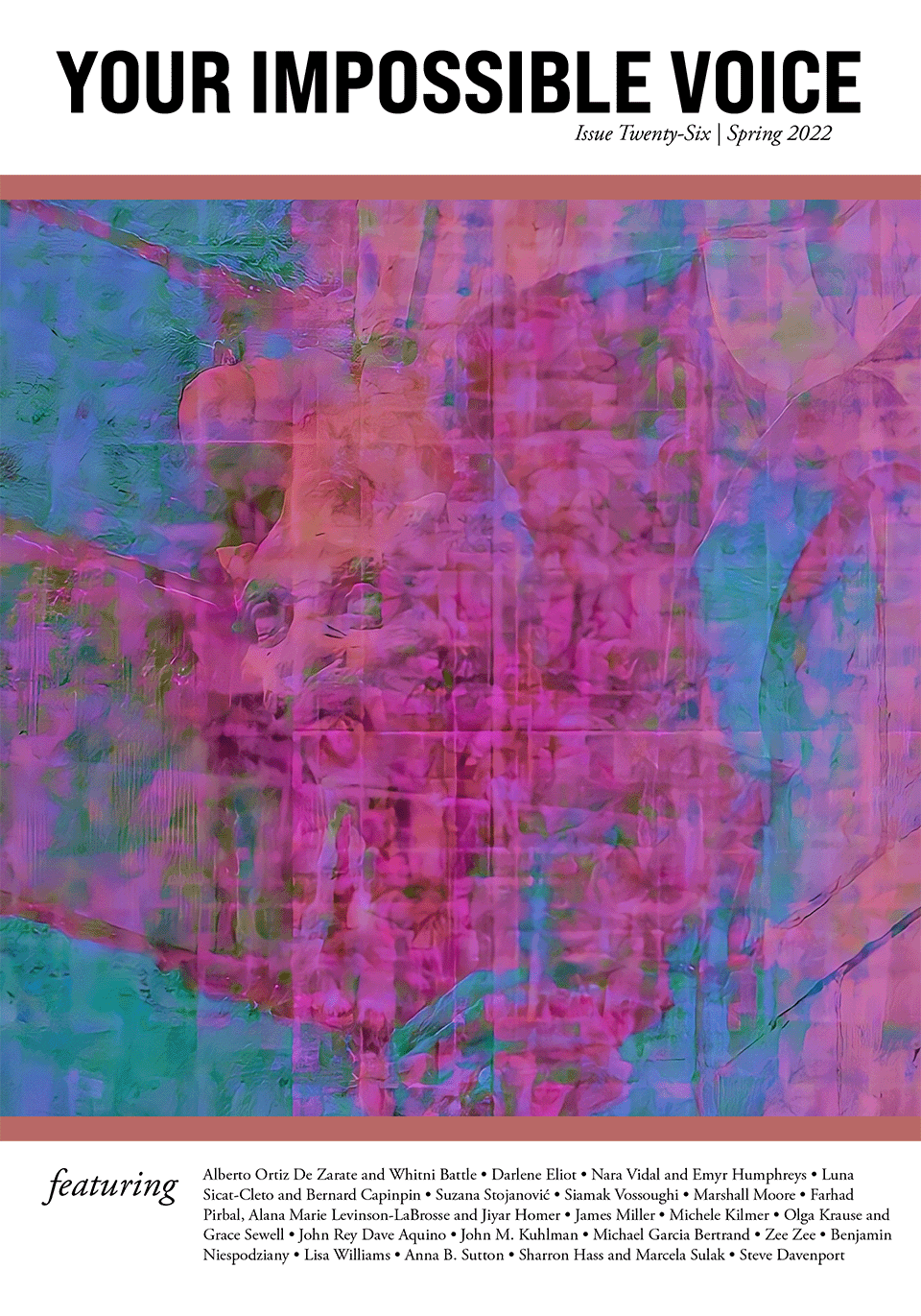Issue 26 | Spring 2022
Excerpts from “Hehasnoname”
Sharron Hass
Translated by Marcela Sulak
these are not lines of poetry
the poem is soaked in darkness
it moves along the tracks on the other side of words
and it screeches. I hear the screeching.
I was sitting beside the wanderer and he vanished in the lawlessness of blood
one hand held the dying man – (my whole life revolving on the pressed lines, hard and damp don’t let go)
my eyes are turned to the spirit arising in the corridor (serpents descended the stairs on their ancient legs
before sin and left a trace of light—a place comes closer, and I am within—holding the almost dead body
so as not to drop into the spirit that the serpents left—
and I saw how poetry holds back another moment the approaching might from him whose might is being taken
I was holding the almost dead—palm to palm, tenderly
I hear the words from the other side joined to their visible kin, but no
they aren’t alike, winged creatures and reptiles are more alike than the lines accumulated in the dark
around the soul that is about to blossom? (knock knock question mark
and maybe the missing body will emerge from the events to tell) (my father now stands behind the door)
(pain is the intimacy with the dead that is given to the living)
—❉—
on the kitchen clock—maybe six
on the wrist band—midnight’s ticking
and on the stool fluorescent teatime flickers
the clog and wheel climb into each other silent
and oiled but the high voltage in the nerves
burst into an empty space of musical links, holes opened
in the rhythm of the times, in the slim metal hands
my heart is beaten mad
I came and went
as I wished, a grey mouse, on my skin
my skin—
—❉—
He wakes with great difficulty
he’s an orphan girl who has no model of orphanhood
her hope is not for what is impossible, like the resurrection;
her desire is another impossibility
that the trees return to the trees and the light to rustle,
the snake to rest its tail in its mouth
and she will see and she will hear
the unbearable and the inconsolable and the what-has-no-form-to-hold-it
(death—she has clearly seen disappearing—
behind
an open door—)
—❉—
There are days the circling hands of time
are resolved to tell—the form gives birth to the land
where the thing that is born from the rules of the form will flourish
as if seated again at white marriage tables
where the tears are tears of the golden rule partaking in the radiance—
long hours of contention and hunger have preceded it
and there are days—the face of the clock imitates the stars
it’s not enough—it’s not enough—something terrible has happened
and shattered the beauty. The salt has turned
into a weak whispering for the desert—
and how will you summon the hand to grasp what is left—
there is love to be enlisted
—❉—
Hey, Muse! Bless me with language!
No, to ask for language is to turn away from you.
(Why hadn’t it occurred to me before bless me
for I have turned away from you) grant me, Muse, the language to be the written
and the writer of worlds at their meeting. Stand in the syntax and shower me with gold,
the gold of leaves and the gold that the moths under beds don’t eat. O Muse, the path to you
is as difficult as the path to the I is easy and light
“Hehasnoname” appeared in Hebrew in the book Music of the Wide Lane.
About the Author
 Poet, essayist, and author of six poetry collections, Sharron Hass lectures on literature and poetry at the Alma Institute (Tel-Aviv), at the Tel-Aviv Museum of Art, and teaches in the creative writing program at Tel Aviv University. She is the recipient of several poetry awards, including the Hezy Leskly Award (1997), the Art Council Award (1998), the Prime Minister Award (2003), a Fulbright America-Israel Fellowship (2005), the Bialik Prize (2012), the Dolitsky Prize (2017), and the Amichai poetry prize (2018).
Poet, essayist, and author of six poetry collections, Sharron Hass lectures on literature and poetry at the Alma Institute (Tel-Aviv), at the Tel-Aviv Museum of Art, and teaches in the creative writing program at Tel Aviv University. She is the recipient of several poetry awards, including the Hezy Leskly Award (1997), the Art Council Award (1998), the Prime Minister Award (2003), a Fulbright America-Israel Fellowship (2005), the Bialik Prize (2012), the Dolitsky Prize (2017), and the Amichai poetry prize (2018).
About the Translators
 For her current work on Sharron Hass, MARCELA SULAK has received a 2017 National Endowment for the Arts Translation Fellowship. Her translation of Orit Gidali, Twenty Girls to Envy Me, was nominated for a PEN Award for Poetry in Translation. Sulak’s fourth collection of poetry, City of Sky Papers, was a finalist for the 2022 National Jewish Book Award. She’s co-edited the 2016 Rose Metal Press title, Family Resemblance: An Anthology and Exploration of 8 Hybrid Literary Genres. Sulak is an associate professor of English at Bar-Ilan University in Israel, where she directs the Shaindy Rudoff Graduate Program in Creative Writing.
For her current work on Sharron Hass, MARCELA SULAK has received a 2017 National Endowment for the Arts Translation Fellowship. Her translation of Orit Gidali, Twenty Girls to Envy Me, was nominated for a PEN Award for Poetry in Translation. Sulak’s fourth collection of poetry, City of Sky Papers, was a finalist for the 2022 National Jewish Book Award. She’s co-edited the 2016 Rose Metal Press title, Family Resemblance: An Anthology and Exploration of 8 Hybrid Literary Genres. Sulak is an associate professor of English at Bar-Ilan University in Israel, where she directs the Shaindy Rudoff Graduate Program in Creative Writing.
Prose
The Golden Hops Alberto Ortiz De Zarate, translated by Whitni Battle
The Woman in the Murder House Darlene Eliot
Excerpt from Eva Nara Vidal, translated by Emyr Humphreys
Three Propositions of the White Wind Luna Sicat-Cleto, translated by Bernard Capinpin
Iron Cloud Suzana Stojanović
Buffalo Siamak Vossoughi
The First Ghost I Ever Saw Was Marshall Moore
The Lion Farhad Pirbal, translated by Alana Marie Levinson-LaBrosse and Jiyar Homer
The Good Man James Miller
The Teacher
Woodwork
My Wife Was Drunk at Hobby Lobby
Oranges; Charcoal Michele Kilmer
Ode to Zheka Olga Krause, translated by Grace Sewell
Padre de Familia John Rey Dave Aquino
Excerpt from Dictionary John M. Kuhlman
Gospel of Mary Michael Garcia Bertrand
Poetry
There are No Salvageable Parts Benjamin Niespodziany
Sunday in the Woods
You Is Not the Room Lisa Williams
I Cloud the Moon
Lost Creek Cave Anna B. Sutton
Excerpt from “Hehasnoname” Sharron Hass, translated by Marcela Sulak
Moon Talk Steve Davenport
The Son of a Bitch of Hope After

